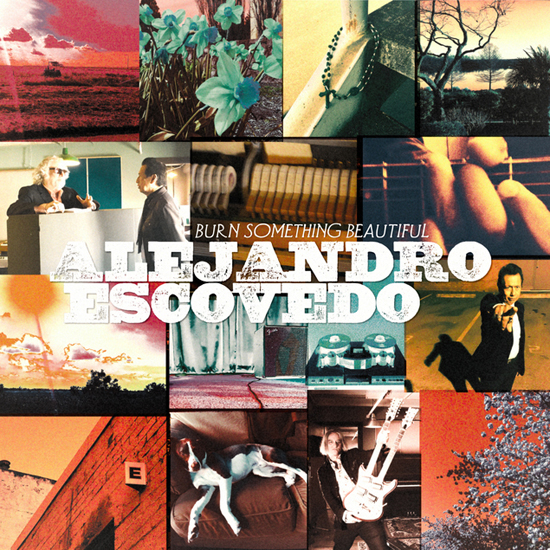Music
1. Alejandro Escovedo – Burn Something Beautiful
It’s been a decade since Alejandro Escovedo released Boxing Mirror, the album that marked his comeback after a bout with Hep C left him unable to tour and make a living from his music. That kicked off a six-album stretch of fresh, vital rock and roll that extends to his latest, Burn Something Beautiful, out today. Burn is a slight departure for Escovedo. His previous three albums were produced by Tony Visconti and co-written with Chuck Prophet. The new album was produced by and co-written with Scott McCaughey and Peter Buck, who have pushed Escovedo even further toward his Ian Hunter/Marc Bolan influences. You can hear it on the churning fuzz of “Shave the Cat” and “Beauty of Your Smile,” straight from the “Bang A Gong (Get It On)” template. Escovedo and Hunter have always shared a knack for unabashedly emotional personal storytelling, and that you can hear on “Suit of Lights,” a duet with Kelly Hogan. Another of Escovedo’s fine attributes – his off-kilter sense of humor – is also well-represented here. He speak-sings lines like “The ghosts of the doorman/Still smells like piss and howl for no reason/At the ghosts of long shoremen” and “The candyman and the starman/Are taking trips from the shaman/Who’s working under the webcam/All angles and long shots.” And then the punchline, “No one can take the beauty of your smile.”
As much as Burn Something Beautiful bristles with that aforementioned vitality, there’s also a looming sense that the rock and roll trip has been fun, but everything comes to an end. “And I wonder why I don’t even wanna play guitar anymore/When there’s no stories left to sing/That’s the end of everything,” he sings on “I Don’t Want To Play Guitar Anymore.” Escovedo has survived the rock and roll life, and now he’s got to contend with the ghosts of those who didn’t. “I miss my friend with the heartbeat smile,” he sings on “Heartbeat Smile.” The last two songs make for an especially bracing one-two punch. On “Farewell to the Good Times,” he sings, “If the world’s too fast for living/And dying so easy to so/Look out any broken window/Is it time to see it through.” The album is capped off by “Thought I’d Let You Know,” a simple melody floating above skittering saxophone and guitars, a throbbing synth, and rolling drums. “Just thought I’d let you know,” he sings, “The party’s over/There’s no more furniture left to break/Glasses left to smash.” And yet, he sings of children with pretty hair who “sing like their mothers” before Hogan sings the refrain, “We’re not alone/We are all alone.” The bones are brittle, he says, but noisy. And they might make way for the next group of pretty voices eventually, there’s still plenty of wonderful noise yet to be made.
 2. Lou Barlow – Apocalypse Fetish (EP)
2. Lou Barlow – Apocalypse Fetish (EP)
There are two things at the center of Lou Barlow’s new EP – disappointment and ukulele. We’ll start with the abstract idea and move to the concrete. As Barlow explains on the Joyful Noise site, the title track explores the idea that so many have been predicting the apocalypse for so long that they’re sad it hasn’t come yet. “And, perhaps,” he writes on the site, “we’ve decided to take matters in our own hands and ‘bring it on’ because, if it doesn’t come soon, then didn’t we all seem foolish talking about it all. the. time.” Fitting, coming at the height of the pre-election frenzy, when the nuttiest of nuts make the direst of these predictions. The other four songs are more personal than political. On “The Breeze,” the narrator is trapped in a cycle of chasing impossible love, as Barlow sings, “You resisted me like you resisted everything/I can’t take that all alone/I’ve had enough .” “Anniversary Song” feels like the flipside of that idea, when the narrator finally finds relief in someone who can absorb his insecurities. “I never had enough so/I had to move right in when/You offered me your mind and skin,” sings Barlow. In the meditative “Pour Reward,” the narrator laments the diminishing returns on his addiction. “Try 2 B” accepts that the ideals we’re reaching for might not be attainable, but it’s worth trying for them all the same. The driving instrument in all of these songs is Barlow’s uke, although it is not a cutesy, plinking instrument the way he plays it. His uke is tuned down and has thick strings. His voice and the uke are at the core of all of the arrangements, augments by swelling Korg Synthe-bass, baritone guitar, and acoustic guitar. The combination provides a remarkably versatile and vivid soundscape, from the gently galloping title track to the spare, voice-heavy “The Breeze” and the insistent “Anniversary Song.” The uke is mostly a rhythm instrument, bubbling and vamping, but it can also occasionally take the lead in a melody or a phrase, as on “Pour Reward.” Barlow covers a lot of ground in a short time here, emotionally and musically.
